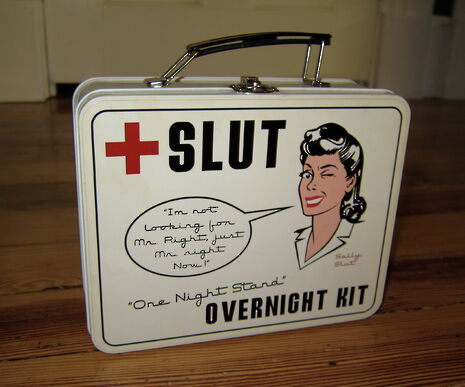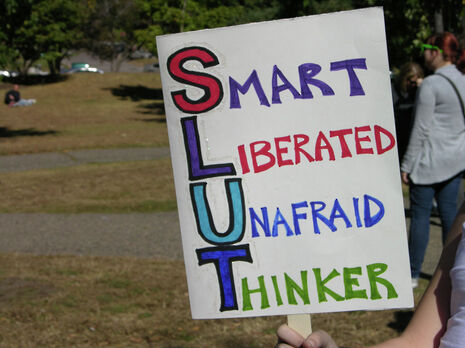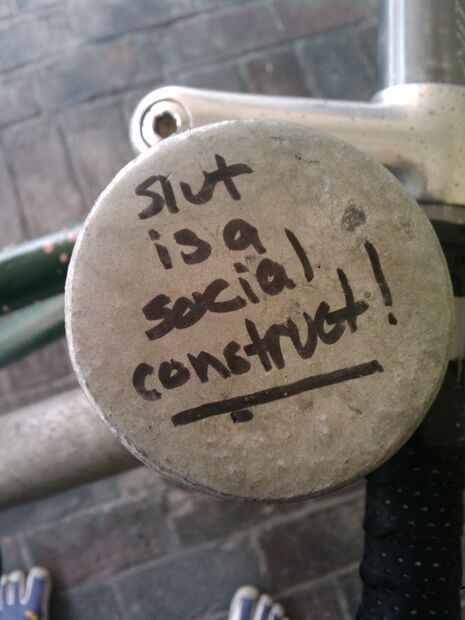The word ‘slut’ – it’s not okay
Let’s abolish it, says Leanne Walstow

The term ‘slut’ is obsolete. I’m stating the ideal here. Why? Because the concept of being a slut is no longer relevant to the society in which we live. Google defines it as ‘a woman who has many casual sexual partners’. Of course, the idea of a woman having ‘many casual sexual partners’ shouldn’t even be an issue anymore (more on this later), but next to this definition you will find the words ‘noun derogatory’, which pretty much seals the argument that the word slut is outdated and should never have gained any legitimacy in the first place.
Historically, ‘slut’ was a synonym for prostitute and these connotations have trickled down into modern-day understandings of the word. Looked at in this sense, ‘slut’ places a monetary value upon sex, thus introducing the idea of someone being merely a sexual object, with accompanying adjectives such as ‘cheap’ and ‘easy’. A word like ‘slut’ is therefore part of a wider cultural vernacular which is derogatory to women.

In a society where many identify as feminists and the majority of us believe in gender equality, why can’t a woman use her body as she wishes and make her own life choices without fearing the judgment of her peers? Through years of women’s rights campaigning, I feel that there has been insufficient discussion of this topic; perhaps because of the tendency to discuss larger, more serious issues like educational inequality, unequal pay, abortion and rape. However, it is this basic attitude towards women, this fear of being judged, which often lies at the heart of these more weighty issues.
In 2012, Laura Bates founded the Everyday Sexism Project, which gives women a space to share their personal experiences of sexist behaviour in their day-to-day lives. This project is part of a larger movement involved with identifying, highlighting and debating these smaller, yet no less significant instances of sexism or misogyny present in everyday life. Being called a ‘slut’ will not necessarily ruin your life, but it is still an unpleasant and undeserved derogation, and a negative value judgement with wider social consequences.
The judgement behind a word like ‘slut’ is also, worryingly, wielded as a weapon to excuse rude or abusive behaviour by members of the opposite sex and, even to mitigate belief in a woman’s right and ability to say ‘no’ in sexual situations. Phrases like, ‘she was asking for it’, imply the same negative moral assessment of women’s behaviour and choice of dress as uses of the word ‘slut’. There should never be a scenario in which a woman’s appearance or actions justify the violation of her bodily integrity. Similarly, there should never be a situation in which using the word ‘slut’ is okay.

It could be argued that movements like ‘SlutWalk’ have sought to reclaim the word. In a translational movement of protest marches, which occurred in 2011, participants in ‘SlutWalk’ were protesting against the use of evidence about a woman’s appearance as an excuse for rape. The protests began in Toronto when a police officer suggested that “women should avoid dressing like sluts” as a precaution against sexual attention. While the message of the movement coincides with what I’m arguing for in this article, I don’t see its name as helpful. Instead of empowering women, or seeking to re-appropriate the word’s meaning, use of the word ‘slut’ in this context serves to support the label bestowed on women by misogynistic men and potentially trivialises a very serious issue.
This proves the point that women are often their own worst enemies in this matter. When a woman is called a ‘slut’ by another woman, we are, in effect, denying our right to sexual freedom and propagating the myth that there is a preconceived sexual norm to be followed. We are also saying that it is acceptable to place a label on another woman’s behaviour. It is significant that there is no strictly male equivalent of the term ‘slut’, which implies that this sexual norm applies exclusively to women.

So next time you find yourself thinking, or voicing the word aloud, think about the kind of society you want to live in. No one has the right to stand in judgement of another person’s life, especially when such a judgement is used to perpetuate an image of women as sexual objects, or to ignore a woman’s right to object to sexual advances. The elimination of such a demeaning word from our vernacular represents a key step in establishing a ‘new ordinary’ – a society in which women can be equal, safe, and free of judgement for the choices they make in their private lives.
 Interviews / Lord Leggatt on becoming a Supreme Court Justice21 January 2026
Interviews / Lord Leggatt on becoming a Supreme Court Justice21 January 2026 Features / Are you more yourself at Cambridge or away from it? 27 January 2026
Features / Are you more yourself at Cambridge or away from it? 27 January 2026 News / Reform candidate retracts claim of being Cambridge alum 26 January 2026
News / Reform candidate retracts claim of being Cambridge alum 26 January 2026 News / Stand Up To Racism protests in solidarity with Minneapolis marches28 January 2026
News / Stand Up To Racism protests in solidarity with Minneapolis marches28 January 2026 News / Vigil held for tenth anniversary of PhD student’s death28 January 2026
News / Vigil held for tenth anniversary of PhD student’s death28 January 2026









